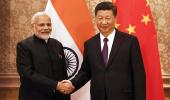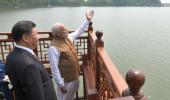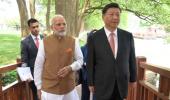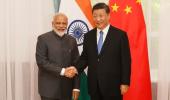'The government's August 5 decision has impacted India-China relations, but it is not very significant or very different. Things like this have happened in the past.'
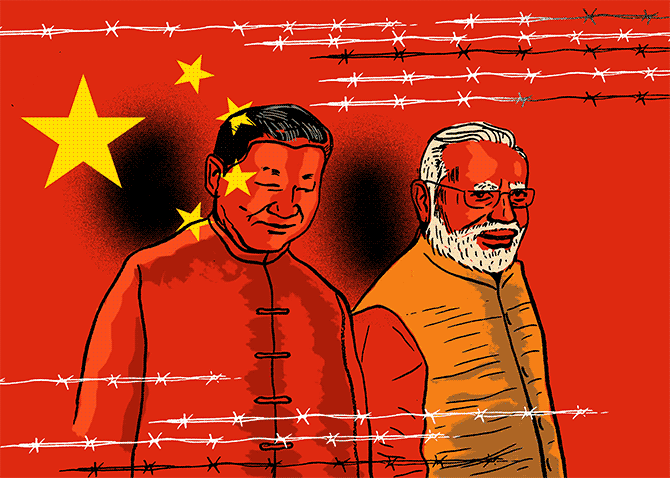
"The axis between Pakistan and China is becoming stronger and will continue in the next few years. Therefore, China, instead of taking an independent decision (on the abrogation of Article 370 and reorganisation of Jammu and Kashmir), has been influenced far too much by Pakistan's reaction, Ambassador Gautam Bambawale, India's former envoy to China, Pakistan and Bhutan, tells Rediff.com's Archana Masih in the first of a two-part interview.
Do you believe India-China relations have entered a period of uncertainty after the government's August 5 decisions annulling Article 370 and reorganising J&K?
India-China relations were always very complex. There are both areas of competition and cooperation in India-China relations.
Many of us who had participated in the Wuhan informal summit between Prime Minister Modi and President Xi had repeatedly said, particularly to the media which was talking of the 'Wuhan reset', to be very careful of using such terminology, because Wuhan was a continuation of what has happened in the past.
Therefore, the August 5 decision has impacted India-China relations, but it is not something very significant or very different. Things like this have happened in the past.
For example, India's testing of its nuclear weapons in May 1998 also impacted India-China relations, and the relationship has come through that.
I don't understand when people say this is something major. People who say that don't understand history, and haven't read the past.
It has to be realised that India-China relations are complex and this is yet another stage where we find a complexity in the relationship which is not very different from the past.
What do you make of China shepherding the discussion on Kashmir at the United Nations security council? (China pushed for a closed door discussion on Kashmir at Pakistan's behest at the UN security council. The meeting ended without a statement or outcome and foiled Pakistan's attempt to internationalise Kashmir.)
China has made a bit of a mistake in its reaction to the August 5 decision.
What the Government of India has done on August 5 is that it has changed the way a particular part of India -- in this case Jammu and Kashmir -- is administered and governed.
These changes are made by governments in all countries. Therefore, it is mainly a domestic issue which impacts India internally.
It doesn't have repercussions for India’s external boundaries. We will still have to negotiate our external boundaries with both China and Pakistan, and therefore, I think the Chinese have not reacted correctly.
They must seriously introspect and change their position about what has happened on August 5.
What did China expect to gain from such an action?
The axis between Pakistan and China is becoming stronger in the last few years and will continue in the next few years.
Therefore, China, instead of taking an independent decision on this matter has been influenced far too much by Pakistan's reaction.
I would like China to take decisions on such issues independent of Pakistan's reaction and, like in the past, revert to its position that Kashmir is an issue that must be sorted out by India and Pakistan.
China should not be influenced by what Pakistan's reaction is.
Has this come about because of the China-Pakistan Economic Corridor?
CPEC is a manifestation of this growing axis between China and Pakistan.
They have close economic relations, particularly through CPEC.
Both the countries also have established closer military ties. Increasingly, a lot of Pakistan's military equipment is being sourced from China and is being made in China.
This China-Pakistan axis is something India will have to factor in the present and the future. We have the capacity to work on that joint axis between those two countries.
What are your thoughts on Kashmir featuring in the China-Pakistan joint statement after the Chinese foreign minister's visit to Islamabad?
Given the recent developments, it is not surprising that it featured in the joint statement of the two countries. But the positions of the two countries are known, so what is said in the joint statement is nothing new.
Also, their position is not impacting any other country in the world. Other countries are taking an independent view of what happened on August 5 and after.
We should not place too much importance on the joint statement between China and Pakistan, just as we do not place much importance on what Pakistan itself is saying, including the irresponsible statements by Prime Minister Imran Khan talking about war and nuclear war.
These are very irresponsible statements made by the person in charge of the country. It is something that we must protest against.
Introducing Ladakh into the equation by China was unexpected, wasn't it. (The Chinese foreign ministry objected to the formation of Ladakh as a Union Territory, thus implying China's claims over the area.)
Ladakh has been a part of the state of Jammu and Kashmir and now India has decided that that part of the country will be administered in a slightly different manner.
It is entirely India's domestic matter. Both Pakistan and China should have kept out of it because it has no ramifications for the external boundaries of India.
Do you foresee China trying to muddy the waters over Kashmir, raising Ladkah to the level it has done Arunachal Pradesh?
They can do what they want. India will do what is in its national interest and in that national interest there are certain territories that are an integral part of India like J&K and Arunachal Pradesh. We will continue to work on that basis.
India is self confident, India is assured that its position is correct and we will continue on that basis, irrespective of what Pakistan or China say.
